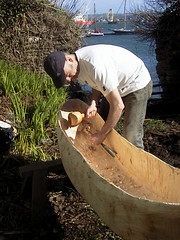Materials to support the talk will be hosted at this site.
Further information from:
Clare Hearn 01326 310977 clare@falmoutharts.org and www.cafescientifique.org
Isn't the law wonderful, in its purity and clarity of expression?
Here we have Principle 1 from the Rio Declaration 1992 (not actually law):
Human beings are at the centre of concerns for sustainable development. They are entitled to a healthy and productive life in harmony with nature.
And from the United Nations Framework Convention on Climate Change - Article 3:
The parties should protect the climate system for the benefit of present and future generations of mankind.
What we don't relaise is the horse trading that lies behind the development of international law. Phillippe Sands QC has written persuasively about the manipulations that lay behind the Earth Summit, with the United States bringing a team of over 100 lawyers, whilst the Pacific States had a team in single digits.
More prosaically, the Environment Protection Act of 1990, section 33:
A person shall not deposit controlled waste
Unfortunately there are significant questions over how we a s a nation deliver environmental justice. According to the Environment Agency, there is a clear correlation between low environmental quality and social deprivation.
- Prosecution
- Civil Action
- Judicial Review
Judicail Review is an interesting concept. It allows a group or individual to review an offical action or inaction for lack of constitutionality. However, with environmental claims it can be difficult of prove "standing". Environmental Judicial Reviews run at about 25 to 30 a year.
Day to day environmental issues are encompassed by part III of the Environmental Protection Act http://www.opsi.gov.uk/acts/acts1990/Ukpga_19900043_en_4.htm#mdiv79. This covers noise, smoke, fumes, gas, dust, steam, insects and artificial lighting.
The Local Authority instigate the prosecution, having had an assessment of the nuisance by the Environmental Health Officer.
Wild Law
A current dilemma facing marine spatial planning is scallop dredging. According to the Marine Conservation Society (2006)
MCS is hugely disappointed at the lack of concrete measures being proposed today by Defra to protect the biodiversity-rich reefs of Lyme Bay. A considerable effort has been made by English Nature and Devon Wildlife Trusts to demonstrate the damage being done to one of the UK?s only soft corals, the pink sea fan, yet the government has ignored their advice to close off just 10.3% of the bay to stop destructive fisheries, and has instead called for even smaller voluntary closures to restrict scallop dredge boats. Despite having the same legally protected status as the golden eagle, marine life such as the pink sea fan is only afforded paper protection and voluntary compromises, because the public cannot see the damage that is being done.
Last night at the Falmouth SAC Advisory Group meeting we discussed the scallop dredging within the SAC. At time of writing our deliberations and conclusions remain confidential. The legal position is that DEFRA issue licences, and are the relevant authority to take action. In terms of the Precautionary Principle (Rio Declaration Principle 15 states
In order to protect the environment, the precautionary approach shall be widely applied by States according to their capabilities. Where there are threats of serious or irreversible damage, lack of full scientific certainty shall not be used as a reason for postponing cost-effective measures to prevent environmental degradation. )
Does the precuationary principle apply to scallop dredging?
In terms of bio-diversity, scallop dredging destroys all sedentary sea life. The scallops regenerate, but nothing else does. There is also significant by-catch on virgin seabed, of up to 10%. Given that the scallop is traditionally a symbol of fertility, there is some irony.
On the other hand, scalloping is an important earner for inshore fishermen - it is suggested (http://www.guardian.co.uk/fish/story/0,,1789620,00.html) that 25% of Brixham's landed income derives from the scallop. This income sustains a thriving community.
There may be a facility under existing legislation to challege scallop dredging within SAC waters, which I am working on at the moment. Local Sea Fish Committees have the ability to ban dredging out to 3 NM. As these Committes are a function of Local Government, there are obvious issues of local politics. Scallop dredging has been banned within the Estuary - see http://www.defra.gov.uk/corporate/regulat/ria/2004/scallopdredging.pdf
And we mustn't forget the provisions of the Natural Environment and Natural Communities Act 2006 section 40:
40
Duty to conserve biodiversity
(1) Every public authority must, in exercising its functions, have regard, so far as is consistent with the proper exercise of those functions, to the purpose of conserving biodiversity.
The administrative situation is that DEFRA issue licneces for scallop dredging, which imposes an obligation on fishermen to submit to DEFRA monthly landing statistics. These licences cannot be unreasonably refused. The Sea Fisheries Committee suggest that as DEFRA is the relevant statutory authority, it is they who should take action. Notice the conflcit with the paragraph above.
My suggestion is that every effort be made to involve the fishing community in the bio-diversity debate, and seek to encourage an appreciation of truly sustainable fishery practices. So far as scallops are concerned, this means hand-picking by underwater divers.
Mind you, the market is surely wide open to develop an ROV type device that harvests scallops.
Yum!


